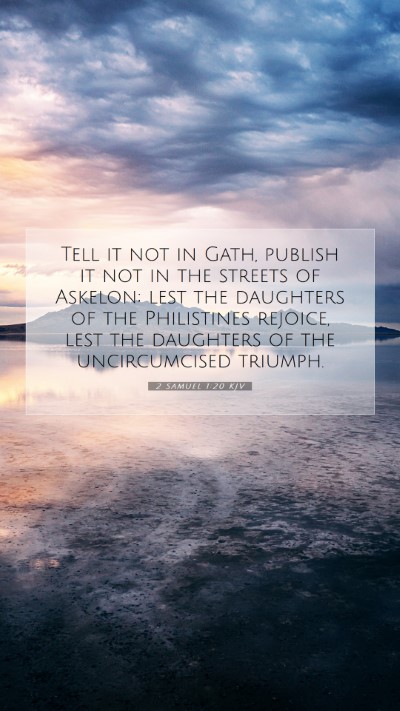Understanding 2 Samuel 1:20
This passage presents a poignant moment in the narrative of David following the death of King Saul, contextualizing not just the emotions involved but also the broader implications of this event in biblical history. The verse reads:
"Tell it not in Gath, publish it not in the streets of Askelon; lest the daughters of the Philistines rejoice, lest the daughters of the uncircumcised triumph."
Background and Context
After the death of Saul, David laments not only for his mentor but also for the consequences of this loss. The context of war with the Philistines and the ongoing rivalry highlights the stakes involved. Saul’s fall leads to opportunities for their enemies, and David's declaration serves as a protective measure against any potential mockery.
Key Themes and Analysis
1. Mourning and Respect
David expresses profound sorrow for Saul’s death, highlighting the complexities of their relationship. Matthew Henry emphasizes that despite Saul's flaws, David still honors him as the Lord's anointed. This reflects a deep understanding of respect for God’s choices in leadership.
2. The Dangers of Public Discourse
The councelling against publicizing Saul's death indicates the potential for exploitation by enemies. Albert Barnes points out that such news could embolden the Philistines, allowing them to celebrate and deepen the division among the Israelites. The emphasis is on strategic silence for the sake of the nation’s collective dignity.
3. Enmity between Israel and Philistia
David acknowledges the history of conflict and rivalry. Adam Clarke comments on how the Philistines would rejoice over an Israelite's misfortune, thus highlighting the broader spiritual and national ramifications of public knowledge about Saul’s death.
4. Honor and Shame in Ancient Cultures
In David's plea lies a cultural understanding of honor and shame. The mourning practices in ancient Israel were deeply intertwined with their identity and societal expectations. The public reaction to Saul's death could potentially shift narratives that preserve Israel’s solidarity in the face of Philistine threats.
Lessons and Applications
The insights from this verse are profound for contemporary readers and offer significant Bible study insights for various contexts:
- Value of Mourning: Recognizing the importance of grieving and honoring those who have passed, irrespective of their flaws.
- The Role of Discretion: Understanding when to speak and when to maintain silence for the greater good of a community.
- Awareness of Cultural Dynamics: Being sensitive to the perceptions held by others regarding one's actions and words.
Related Cross References
- 1 Samuel 31:8-10 - The account of Saul's death.
- 2 Samuel 1:1-16 - David’s lament for Saul and Jonathan.
- Psalm 78:67-72 - Referencing God’s choice of Shepherd for His people.
Conclusion
The message of 2 Samuel 1:20 resonates through generations, emphasizing the significance of honoring one’s leaders, recognizing the potential consequences of our words, and promoting unity in times of division. As we study this verse, we are reminded of how history informs our present and the importance of our legacy in the eyes of God and society.
Further Study Resources
For those engaging in Bible study groups, online Bible study, or seeking bible study resources, consider reflecting on the implications of this verse within the wider narrative of Davidic leadership. Various Bible study guides and Bible study plans can facilitate deeper exploration and understanding of the multifaceted nature of scripture passages and their applications in everyday life.


